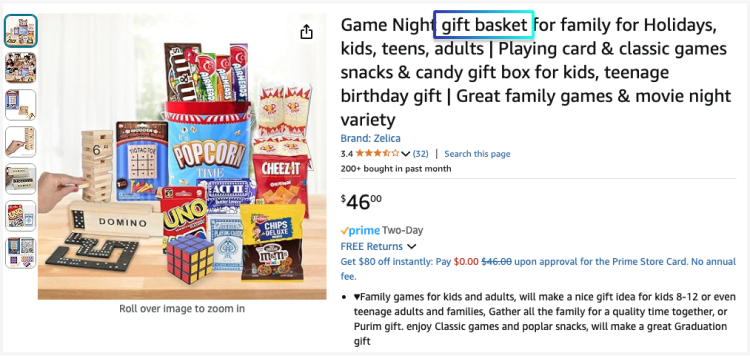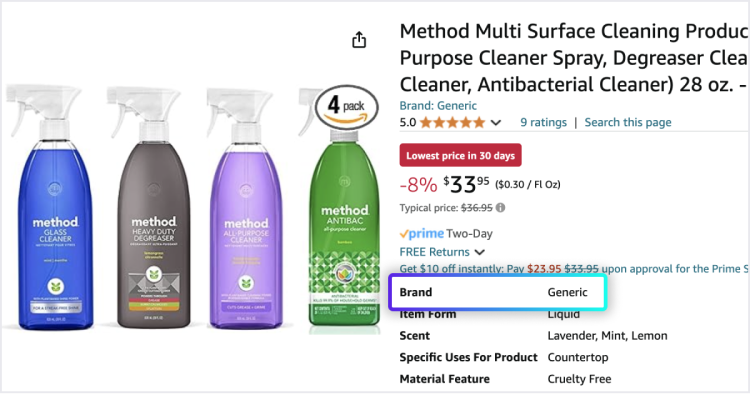[Originally Published: July 2024 | Last Updated: December 17, 2024] This article has been expanded with new information about Amazon’s product bundling policy. Key updates include:
- Detailed clarification on the “Gift Basket Exception” and its implementation
- Additional seller community feedback and enforcement experiences
- Expanded guidance on compliance strategies and inventory management
- Analysis of benefits for CPG brands
- Latest enforcement timeline updates from Amazon
Amazon’s recent update to its bundling policy for consumable goods has sparked sellers’ attention. The change, which took effect on October 14, 2024, impacts categories like grocery, pet products, baby items, health, and beauty and aims to provide customers with higher-quality bundles. But what does this mean for Amazon sellers, and how can they adapt to the new rules?
In this article, we’ll break down Amazon’s official announcement, provide expert insights on how it will affect sellers, and discuss the broader reaction from the Amazon seller community. If you’re selling in these categories, this update is critical to understand.
Key Points of Amazon’s New Bundling Policy
| Policy Aspect | Details |
|---|---|
| Effective Date | October 14, 2024 |
| Mixed-Brand Bundles | Prohibited unless under exceptions (e.g., gift baskets) |
| Brand Ownership | Bundles must be sold by the manufacturer owning all brands in the bundle |
| Generic Bundles | No longer allowed under seller’s own brand |
| Repackaging | Requires Letter of Authorization from the brand owner |
| Enforcement Timeline | Expected by late Q4 2024, with 30-day notice before action |
| Gift Basket Exception | Allows mixed brands if physically bundled for gifting purposes |
What is Amazon’s New Bundling Policy?
As of October 14, 2024, Amazon has updated its bundling policy for consumables. Sellers can now only list bundles that are created and offered by the original manufacturer. This means:
- No more mixing brands: You can’t create bundles that mix products from different manufacturers. For example, a bundle containing a Frito-Lay Mixed Chips Pack and a non-Frito-Lay item like a drink or napkins is no longer allowed.
- Brand ownership is key: Bundles must be sold by the manufacturer that owns the brands of all the items in the bundle.
- No generic bundles: Sellers can no longer create generic or unbranded bundles under their own brand. Everything needs to be under the manufacturer’s original brand.
The policy is designed to ensure that only high-quality, brand-owned bundles are sold on Amazon. Sellers who violate these rules may face listing suppression, and Amazon plans to begin enforcement by late Q4 2024, giving sellers a 30-day notice before taking action on non-compliant listings.
The Gift Basket Exception
Amazon clarified that gift baskets are an exception to the new bundling rules. Gift baskets, often sold as snack boxes or holiday-themed assortments, can include items from different brands as long as they are physically bundled together for gifting purposes. This exception provides a valuable opportunity for sellers in categories like snack food and holiday gifts to remain compliant while offering variety to their customers.
However, ambiguity surrounds the “gift basket” designation. Sellers have noted that there is no specific “gift basket” browse node or item-type keyword on Amazon, which creates confusion about how these products should be categorized.
While related subcategories like “Snack Food Gifts,” “Party Mix,” or “Food Assortments & Variety Gifts” exist, Amazon has yet to provide clear guidance on whether these subcategories align with the “gift basket” exception. Sellers are urging Amazon to clarify these categories to enable more accurate compliance and ensure consistent enforcement.
The image below demonstrates how sellers can leverage the “gift basket” strategy to create compliant listings.

In this example, a seller markets a collection of snacks, games, and candy from various brands as a gift basket, effectively navigating the restrictions on mixed-brand bundles.
This approach allows sellers of snack boxes or similar products to continue offering variety while complying with Amazon’s policy.
How This Impacts Amazon Sellers
This policy change primarily affects resellers who were bundling items from multiple brands or creating custom bundles under their own private labels. Here are the key areas impacted:
1. Focus on Manufacturer-Approved Bundles
Only bundles packaged and configured by the original manufacturer or brand are allowed. Sellers cannot create their own bundles by combining products from different manufacturers.
2. Reduced Flexibility in Bundling
Sellers previously had the freedom to create bundles mixing products across brands or even list products under a “generic” brand to target specific niches. For example, a bundle containing snacks from Frito-Lay mixed with a non-Frito-Lay drink is prohibited. Bundles must consist only of products from the same brand, limiting sellers’ flexibility in creating multi-brand bundles.

3. Increased Compliance Requirements
If sellers wish to repackage products, they must obtain a Letter of Authorization from the brand owner. Only products within the same brand can be bundled together, and all items in a bundle must be branded with that brand’s name.
4. Increased Inventory Challenges
Sellers who have been stocking up on multi-brand bundles may now face inventory liquidation challenges. With Amazon’s enforcement of this policy set to start by the end of Q4, sellers must begin liquidating affected products to avoid being stuck with unsellable inventory. Offering discounts and creating special promotions might be necessary to clear these stocks before enforcement kicks in.
5. Enforcement Uncertainty
While Amazon has promised a 30-day warning before suppressing non-compliant listings, there’s still uncertainty about the exact timeline. Sellers have reported receiving inconsistent notices regarding policy violations in the past, which raises concerns about how smoothly the enforcement process will go.
Seller Sentiment on the Policy Change
The reaction from the seller community has been strong, with many sellers expressing frustration over the new restrictions and how they will affect their businesses.
For instance, one seller pointed out how this update will impact more than half of the grocery and health & beauty categories, where multi-brand bundles have been common. Another seller raised concerns over the enforcement of bundles like snack boxes, which rely on a variety of items from different manufacturers.
Several sellers also reported that their accounts had been suspended for similar violations months before this official update, and they feel Amazon’s rollout of the policy lacked consistency. The seller community is questioning the fairness of these sudden changes, as some sellers were penalized without warning, while others are being given a 30-day grace period.
How This Policy Benefits CPG Brands
1. Reclaim Control Over Brand Representation and Pricing
The policy helps Consumer Packaged Goods (CPG) brands regain control over how their products are bundled and sold. Only manufacturer-approved products can be sold together, ensuring brand consistency.
2. Reduced Risk of Poor Customer Experiences
By eliminating unauthorized bundles, brands reduce the chance of mismatched or incompatible products being sold. This leads to better customer satisfaction, protecting the brand’s reputation.
3. Consistent Quality, Brand Integrity, and Customer Trust
The policy ensures that only authorized, high-quality products are bundled together. This helps maintain brand integrity and builds customer trust.
4. Healthier Margins for CPG Brands
The removal of unauthorized resellers means brands no longer have to compete with artificially low prices set by unauthorized sellers. Less price pressure leads to healthier profit margins.
5. Better Control Over Pricing
With fewer competing bundles, brands can better protect their price points. Brands can enforce MAP (Minimum Advertised Price) policies more effectively.
6. Improved Profitability and Stronger Amazon Relationship
Brands can focus on curated, high-quality bundles that represent their vision and values. This leads to stronger profitability and a more positive relationship with Amazon’s ecosystem.
Our Take on the Policy Update
In our video breakdown of the bundling policy update, Amazon expert Vanessa Hung discusses the significant impact this change will have on resellers. This policy is particularly concerning for those who rely on bundling to differentiate themselves on Amazon.
Key Takeaways from the Video:
- Impact on Private Label: Sellers who were previously using brand registry to access features like A+ content will no longer have this option if they can’t bundle products from different manufacturers.
- Enforcement Timeline: Enforcement could start anytime between late Q4 2024 and early next year, though Amazon has not provided an exact date. Sellers should take this time to liquidate non-compliant bundles as soon as possible to avoid losses.
- Legal Concerns: This policy might have been triggered by lawsuits from brands upset about unauthorized reselling practices. For example, a brand like Skittles might not want its products bundled with items from other manufacturers, leading to this stricter enforcement.
Actionable Steps for Sellers
If you’re an Amazon seller in the affected categories, here are some actionable steps you can take to stay compliant with the new bundling policy:
1. Audit Your Current Listings:
Identify any bundles that include items from multiple manufacturers or unbranded products. Start preparing to liquidate these products by running special promotions or discounts.
2. Create New Compliant Bundles:
Shift your focus to creating bundles that include products from the same manufacturer. For example, if you sell Frito-Lay products, make sure your bundles consist only of Frito-Lay items.
3. Explore Gift Basket Options
If you sell multi-brand snack bundles, consider rebranding them as gift baskets, as shown in the image. Ensure they’re packaged attractively and listed under suitable categories for gifting.
4. Communicate with Your Clients:
If you’re an agency working with clients, inform them of the policy changes and help them adjust their bundling strategies. Offer guidance on how to stay compliant and avoid penalties.
5. Monitor Account Health:
Pay close attention to your account health dashboard for any notices regarding non-compliant listings. Amazon has promised a 30-day grace period before enforcement, so stay vigilant to avoid sudden listing suppression.
Be Proactive and Stay Ahead
Amazon’s new bundling policy introduces significant changes that will impact sellers, especially those operating in categories like grocery, health, and beauty. While the policy is designed to enhance customer satisfaction with higher-quality bundles, it also creates challenges for sellers.
Don’t wait until enforcement starts—take action now to audit your listings, adjust your bundling strategies, and stay compliant. This will help you avoid potential penalties and ensure your business continues to thrive on Amazon.
For additional support, tools are available to help you manage your listings, monitor policy updates, and ensure compliance with Amazon’s evolving guidelines. By leveraging these resources and acting quickly, you can minimize disruptions and continue growing your business smoothly.








